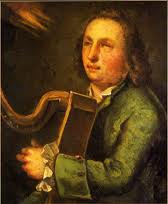Annotation:Edmund McDermot Roe: Difference between revisions
No edit summary |
No edit summary |
||
| Line 3: | Line 3: | ||
<p><font face="garamond, serif" size="4"> | <p><font face="garamond, serif" size="4"> | ||
'''EDMUND MACDERMOTT ROE'''. AKA - "Edmond MacDermott Roe." Irish, Planxty (6/8 time). F Major. Standard tuning (fiddle). AB. Composed by blind Irish harper Turlough O'Carolan (1670-1738). | '''EDMUND MACDERMOTT ROE'''. AKA - "Edmond MacDermott Roe." Irish, Planxty (6/8 time). F Major. Standard tuning (fiddle). AB. Composed by blind Irish harper Turlough O'Carolan (1670-1738). | ||
[[File:carolan.jpg|200px|thumb|left|Turlough O'Carolan]] | |||
<br> | <br> | ||
<br> | <br> | ||
Revision as of 02:21, 22 March 2013
Back to Edmund McDermot Roe
EDMUND MACDERMOTT ROE. AKA - "Edmond MacDermott Roe." Irish, Planxty (6/8 time). F Major. Standard tuning (fiddle). AB. Composed by blind Irish harper Turlough O'Carolan (1670-1738).

The MacDermot Roes were a powerful family from County Roscommon. Donal O'Sullivan records that the MacDermott Roe family, were, "one of the two branches of the ancient Connacht clan, the MacDermotts, Princes of Moylurg. They were also Catholic. O'Neill (1922) remarks: "Among Carolan's many distinguished friends and patrons, no one was more generous and loyal than Mrs. McDermot Roe, of Alderford House, County Roscommon. At the outset of his professional career in 1693, it was she who equipped him with a horse and an attendant harper; and it was to her hospitable home he directed his feeble footsteps in his declining days. Exceptionally honored in death, Carolan's remains were interred near the family vault of his benefactress." A later MacDermot Roe figures in a story related by the blind harper Arthur O'Neill (1734-1818). O'Neill related in his memoirs meeting many different itinerant harpers in his wanderings, one of whom was named Andrew Victory, a blind harper from County Longford. "He told me once in the County of Roscommon at the house of a Mr. MacDermot Roe, who said to him one day, 'Th'anam 'un deabhail' [damn you], where were you the day the Battle of Culloden was fought?' (an allusion the harper's name, Victory, juxtaposed with the defeat of the Jacobite Bonnie Prince Charlie, an Irish and Scottish hope). 'Och sir,' says Andrew, 'it was well for the Duke of Cumberland I was not, otherwise he would not have the honour of being called Billy the Butcher." The Duke of Cumberland, William, son of George III, was indeed called Butcher Cumberland for his harsh repression of the Jacobite rebels, and Andrew boasts had he been there the outcome would have been different.
Source for notated version: copied from the Hibernian Muse (1787) [O'Neill]; John Lee's A Favourite Collection of the so much admired old Irish Tunes, the original and genuine compositions of Carolan, the celebrated Irish Bard (Dublin, 1780) [O'Sullivan].
Printed sources: Complete Collection of Carolan's Irish Tunes, 1984; No. 85, pg. 69. O'Neill (Waifs and Strays of Gaelic Melody), 1922; No. 72 (appears as "McDermot Roe"). O'Sullivan (Carolan: The Life, Times and Music of an Irish Harper), 1958; No. 85, p. 147.
Recorded sources:
Back to Edmund McDermot Roe
